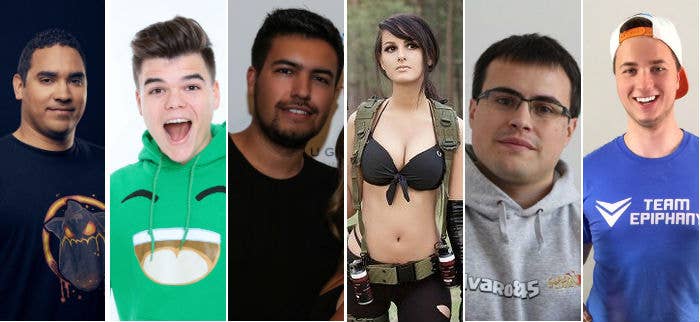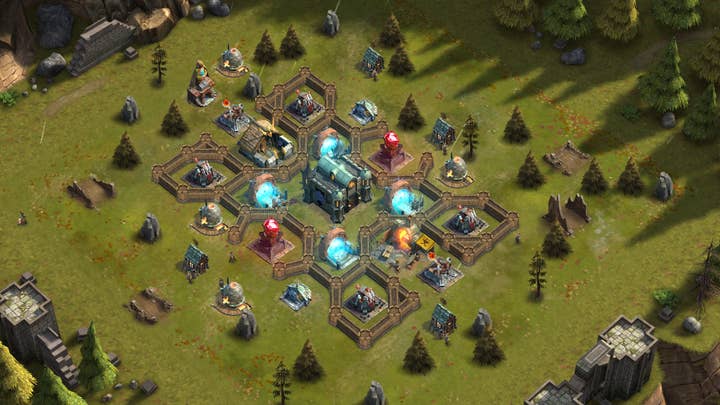Working with influencers: “The internet can smell disingenuity a mile off"
Space Ape's Simon Hade discusses the perks and pitfalls of working with YouTubers and streamers
When UK developer Space Ape Games was first developing Samurai Siege, the team found itself in conversation with Flammy, host of one of the bigger YouTube channels at the time - back in the pre-PewDiePie days when 100,000 subscribers made you a big deal.
The conversation evolved into an internship for Flammy, where he helped design some of the game's under-the-hood features. He also introduced the team to an avid player by the tag JorgeYao, real name George - now product manager of an upcoming Space Ape title and employee of three years.
The point of these anecdotes? That working with those highly-coveted influencers can yield far more interesting opportunities than just video and social media coverage.

That's the message Space Ape hopes to spread with a new event it's hosting this coming Monday (Janaury 30th), inviting YouTubers and live-streamers to come and meet several promising indie studios.
The catchily-titled London's Best Of 2017 Indie Dev Influencers Junket will feature presentations from both developers and YouTubers, with the latter discussing their relationship with the industry, followed by a game fair in which video creators will be invited to play forthcoming titles and, crucially, offer feedback and ideas. Space Ape already has hosts with a combined audience of millions on board, as well as several mobile and indie studios from around Europe.
"We want to create a forum for those kinds of relationships," CEO Simon Hade tells GamesIndustry.biz. "We want to give independent studios direct access to influencers they'd not otherwise have, and give the influencers visibility into exciting games that are coming up, which they might not otherwise see.
"My dream is that both sides win big: to see a developer's game blow up because it captures the imagination of one of the big channels and gets exposure beyond what the studio might be able afford, and one of the channels doubles their subscriber count overnight by making that defining video of the next big thing at just the right time. And hopefully that kind of success turns this into a regular thing."
"Take the influencers as seriously as you'd take a pitch to a recording artist or a Hollywood personality or a movie IP because in many cases they have more influence"
Hade stresses that when talking to influencers, a studio's goal should be more than just promotion for their game. As he observes, "all coverage is not equal".
"These days it is impossible to 'buy' endorsements from influencers in a way that makes any economic sense," he says. "The videos where someone is paid to promote a game they aren't passionate about don't deliver the performance needed to justify repeat spend, and the influencer loses subs, so in the end everybody loses.
"I think of coverage as the by-product of a meaningful relationship between the developer and influencer. It's only valuable when the influencer is really invested in what you are doing and believes the content is interesting for their followers. By involving influencers during the development process you have a much better chance of understanding why they think the game would be interesting for their audience and shape the game accordingly. If you're able to have a conversation with an influencer about why your game won't work for their channel, that is incredibly valuable.
"But the commitment must be genuine. It's not enough to just demo the game - you need to be ready to receive their feedback. Audiences on YouTube or Twitch respond very negatively to insincerity. Good influencers know this and will only work with games they genuinely like. By involving them in the process, you increase the odds of that happening."

Influencers can also benefit from building a relationship with studios. The more informed they become about the process of games development, the better they will be able to identify opportunities to be the first one covering the next big thing. It will also give them the context to make better, more informed and, hopefully, more enjoyable content.
"You need to think about YouTubers in your game design and not just expect to be able to pay someone to make a video and have greatness follow"
Hade even suggests getting your game into the hands of influencers as early as possible. For Rival Kingdoms, Space Ape made sure at least a couple of hundred people involved in the game's alpha were influential players or YouTube creators.
"Many developers would not expose their game to real players at this stage, let alone really influential ones, but we really needed the feedback from a live community to understand if we were on the right track," Hade explains. "That period lasted for six months and during that time we made some fundamental make or break decisions in the design of the game that we could not have made in a vacuum.
"Equally important was that the people we engaged in alpha became huge advocates of the game. In the two weeks after launch we benefitted from more social media activity than all other midcore games combined - excluding Clash of Clans - and that cohort of players went on to directly or indirectly account for nearly a third of the game's revenue."
Such success is by no means guaranteed. There are plenty of pitfalls to avoid when working with YouTubers, but Hade insists this can be made easier by taking them seriously. Despite the appearances of some, these are not just teenagers with webcams - they should be treated like real businesses.
"It might feel impenetrable to many developers but this YouTube and streaming thing is big business, and it takes a lot of effort and a bit of luck to make it work," says Hade. "Big channels command real influence and can drive significant installs and retention, and there are many cases now of a single video taking a game to No.1 in the download charts. Take the influencers as seriously as you'd take a pitch to a recording artist or a Hollywood personality or a movie IP because in many cases they have more influence.
"Understand the channel. If you're working with a channel that exclusively caters to FIFA, then don't expect them to be effective in promoting your nerdy RPG"
Also, treat them more like a PR channel than one for user acquisition. Like PR, you can't reliably measure the ROI of an individual campaign. Track all the metrics and understand them, but rationalising spend against engaging YouTubers in the way you would a Facebook UA campaign misses the point. Similarly, like PR you need to earn the coverage not transact for it."
It can be tempting to aim for only the biggest channels, the PewDiePies of the world with their millions of impressionable subscribers. But the larger the channel, the harder it can be to get their attention and, as Hade puts it, "align your interests". Instead, smaller channels, ones with 100,000 subscribers or less, can be hungrier and their audiences easier to engage with. The Space Ape CEO also says it's important to understand the channel and their audience.
"If you're working with a channel that exclusively caters to FIFA, then don't expect them to be effective in promoting your nerdy RPG," he says. "Understand why the channel is successful, who the audience is and what they expect. Talk to other developers who have worked with the channel and see what worked and what didn't."

Most studios might assume that getting YouTubers to cover their game requires money, and while that is often the case, influencers need to be offered something more: better content.
"Easy money is interesting to them, but it's not sustainable," says Hade. "After a channel has fleeced each of the MMO strategy games and action RPG let's plays for a few thousand dollars each and driven no installs (and lost some subs to boot), then that gravy train gets uninteresting real fast.
"Offering them content that can help grow and engage their audience is much more sustainable. Integrations in game, exclusive content, watchable gameplay, insights into the development process, charity co-labs, early access - without asking for any commitment in return - all help move things from a transaction to a relationship. It's a harder sell but a more important one."
Hade's final advice is that developers should look beyond just having a video of their game go on the channel. That video should be the beginning, or another milestone, of your relationship with the host - a lot of studios "fall into the common trap of thinking that getting an influencer to make a video about you is the end game".
"The internet can smell disingenuity a mile off. If you remember that rule then everything gets a whole lot easier."
He continues: "The end game is having a situation where there is inherent value for the YouTuber or streamer to keep making videos about your game because that grows and maybe monetises their audience in a sustainable way, and for other influencers to recognise that and follow suit. This means you need to think about this in your game design and not just expect to be able to pay someone to make a video and have greatness follow."
As with any conversation about the relationship between the games industry and YouTubers, the topic of transparency comes up. The high-profile examples of partnerships between channel and publisher are well-documented, but many firms are now putting more effort into openly declaring when they are working with such channels. And, Hade reminds us, YouTube already has rules about disclosing endorsements.
"I think this is a good thing, and should be adopted by all platforms," he says. "I also think there is more work that could be done to bring these rules more in line with the standard of typical journalists' codes of ethics, but on the whole the economics of YouTube means influencers and developers do a good job of self regulating.
"Audiences are showing that they will happily watch their favourite YouTuber or streamer talk about a product fully aware that they are being paid for it, provided the endorsement is genuine and consistent with the brand they have built up around a channel. Those who sell out or are seen to be dishonest lose subs which means they lose money. So there is a very clear financial incentive to be upfront about these disclosures and do the right thing."
With discoverability a growing concern for developers on any platform, particularly PC and mobile, the coverage offered by YouTubers et al can be vital when not only promoting your game but also building a community behind it. Hade describes grassroots community building as "the only viable launch strategy for indies", but warns that engaging with an avid audience - even through video channels - should be thought of as more than just marketing.
"You need to be 100% genuine and committed to treating your community and players as partners in your game development, and not as customers to sell things to or mouthpieces to exploit," he concludes. "The internet can smell disingenuity a mile off. If you remember that rule then everything gets a whole lot easier."
